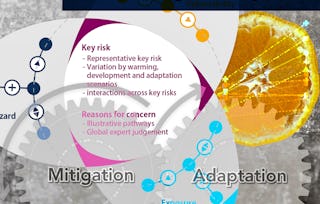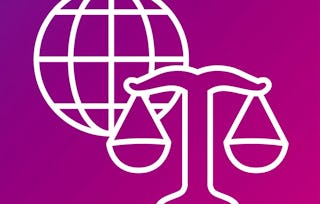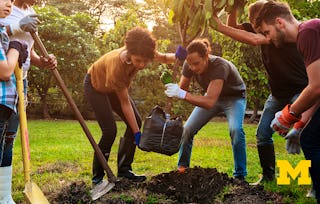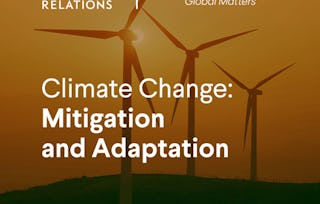Climate change is a global phenomenon, but its impacts vary among different social groups, who perceive and adapt to climate change impacts in different ways. In this course, you will:

Climate change and Indigenous People and local communities

Climate change and Indigenous People and local communities



Instructors: Victoria Reyes García
4,249 already enrolled
Included with
56 reviews
Skills you'll gain
- Governance
- Sustainable Development
- Data Collection
- Research
- Fundraising
- Socioeconomics
- Environmental Monitoring
- Vulnerability
- Social Impact
- Intercultural Competence
- Research Methodologies
- Community Development
- Qualitative Research
- Climate Change Adaptation
- Environmental Issue
- Climate Change Mitigation
- Natural Resource Management
- Cultural Sensitivity
- Environmental Policy
Details to know

Add to your LinkedIn profile
5 assignments
See how employees at top companies are mastering in-demand skills

There are 5 modules in this course
This course on Climate Changes Impacts and Indigenous People and Local communities (IPLC) is divided in five different sections:<br>1) the module 1 aims to present the key notions related to climate change, and to Indigenous peoples and local communities knowledge systems.<br>2) the module 2 will show the different climate changes impacts on IPLC, at the climatic, biological, physical and human systems level.<br>3) the module 3 presents examples of coping and adaptation strategies of IPLC to climate change impacts.<br>4) in the module 4, different methods for data collection on local perceptions of climate change will be presented<br>5) the module 5 aims to give an overview on the governance in global change and the role of IPLC.<br>Overall, this course includes a theoretical and a methodological component, through which you will learn methodologies to conduct research on Indigenous Peoples and local communities’ perceptions of climate change impacts.
What's included
8 videos14 readings1 assignment
In Module 2, we will explain the importance of understanding how climate change impacts Indigenous Peoples and local communities. IPLC are disproportionally impacted by climate change because they depend directly on the use and management of natural resources. We will also present some common approaches to assess the vulnerability of Indigenous Peoples and Local Communities to climate change impacts. Finally, this module will bring examples of how climate change impacts elements of the climatic, physical, biological and human systems, and how these impacts are perceived by Indigenous Peoples and local communities.
What's included
6 videos6 readings1 assignment
In Module 3, we describe coping and adaptive strategies that IPLC from around the word have used to respond to the impacts of climate change. After an introductory video, the module is structured around examples of the following IPLCs' responses: i) sharing and cooperation, ii) diversification, iii) exchange, iv) storage, v) forecasting, vi) rationing, vii) mobility.
What's included
8 videos10 readings1 assignment
In Module 4 we discuss IPLC contributions to climate change research and introduce a standardized methodological protocol to assess such contributions.
What's included
8 videos4 readings1 assignment
In Module 5, we discuss several reasons that describe the importance of bringing IPLC as legitimate actors in global climate policy. We also present current attempts to do so through examples from the literature and existing policy initiatives.
What's included
9 videos8 readings1 assignment
Instructors


Offered by
Explore more from Environmental Science and Sustainability
 Status: Preview
Status: PreviewThe University of Tokyo
 Status: Free Trial
Status: Free TrialImperial College London
 Status: Preview
Status: PreviewUniversity of Michigan
 Status: Free Trial
Status: Free TrialCouncil on Foreign Relations
Why people choose Coursera for their career

Felipe M.

Jennifer J.

Larry W.

Chaitanya A.
Learner reviews
- 5 stars
60.71%
- 4 stars
30.35%
- 3 stars
7.14%
- 2 stars
0%
- 1 star
1.78%
Showing 3 of 56
Reviewed on Nov 15, 2024
This course provided a lot of real information about the realities of the lives of those considered inferior. Great information
Reviewed on Sep 7, 2023
very informative .it has changed my view about the climate change and local indigenous communities
Reviewed on Dec 3, 2021
I loved this course but i would say that the time associated with how long it would take to read all of the papers was very inaccurate. Thank you for this content though it was brilliant!

Open new doors with Coursera Plus
Unlimited access to 10,000+ world-class courses, hands-on projects, and job-ready certificate programs - all included in your subscription
Advance your career with an online degree
Earn a degree from world-class universities - 100% online
Join over 3,400 global companies that choose Coursera for Business
Upskill your employees to excel in the digital economy
Frequently asked questions
To access the course materials, assignments and to earn a Certificate, you will need to purchase the Certificate experience when you enroll in a course. You can try a Free Trial instead, or apply for Financial Aid. The course may offer 'Full Course, No Certificate' instead. This option lets you see all course materials, submit required assessments, and get a final grade. This also means that you will not be able to purchase a Certificate experience.
When you purchase a Certificate you get access to all course materials, including graded assignments. Upon completing the course, your electronic Certificate will be added to your Accomplishments page - from there, you can print your Certificate or add it to your LinkedIn profile.
Yes. In select learning programs, you can apply for financial aid or a scholarship if you can’t afford the enrollment fee. If fin aid or scholarship is available for your learning program selection, you’ll find a link to apply on the description page.
More questions
Financial aid available,



